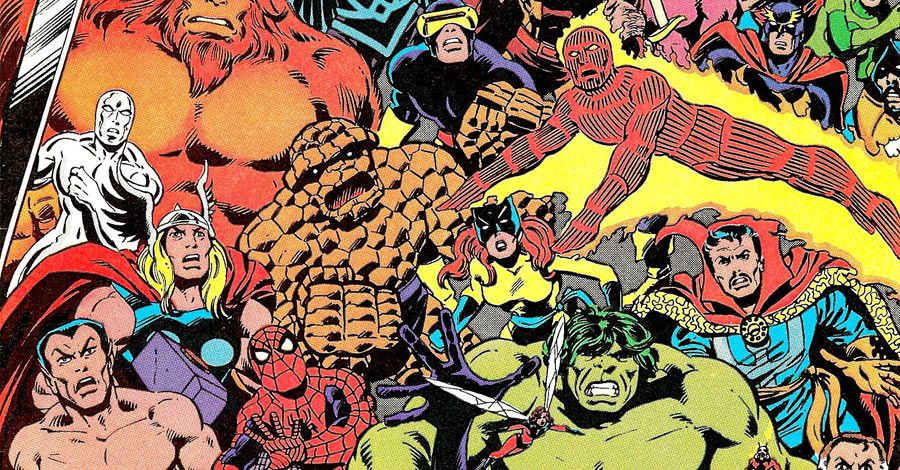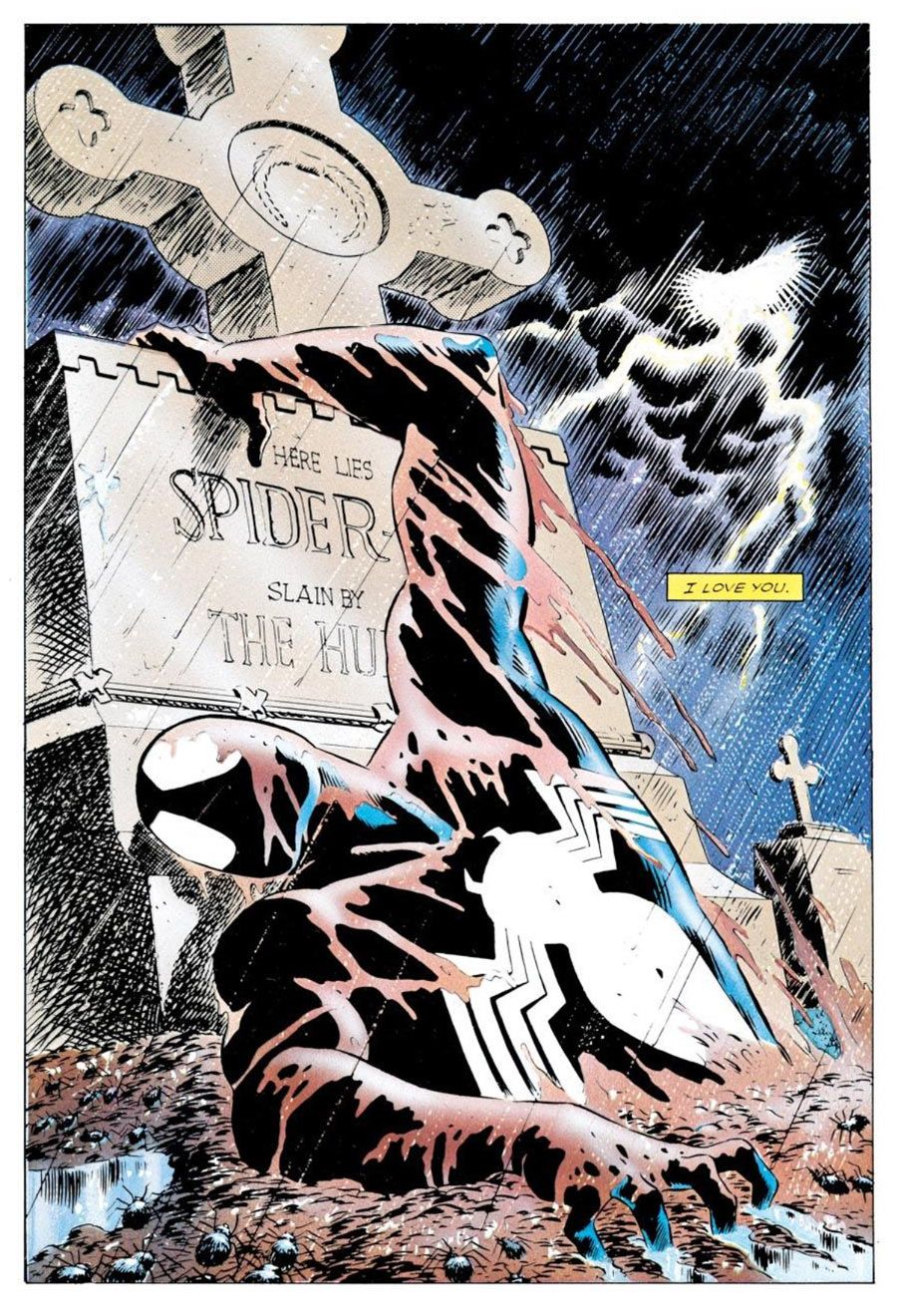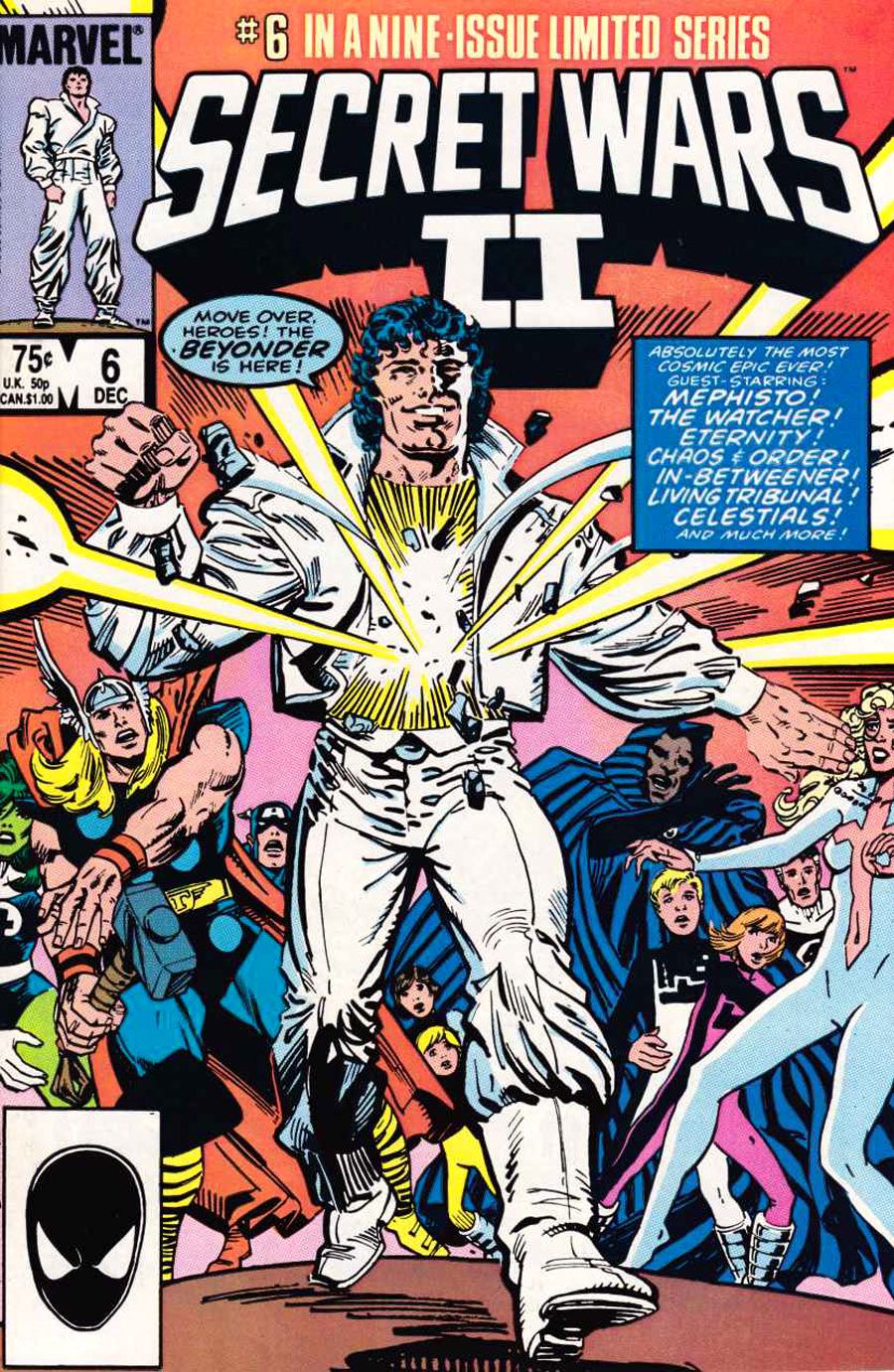As part of a series of panels marking Marvel Comics' 75th Anniversary, Executive Editor Tom Brevoort sat down to talk about event comics with an all-star New York Comic Con panel including Brian Michael Bendis, Kurt Busiek, Tom DeFalco, J.M. DeMatteis, Al Milgrom, Fabian Nicieza and Jim Starlin. Brevoort opened the panel by talking about how the very idea of an event story has transmogrified over the years. "It used to be a big event in a title," he said. "Now, events are planned, marketed and built as stand-alone projects and that evolved over time." "Secret Wars" was cited as the first, while one of the most fondly remembered is the Starlin-crafted "Infinity Trilogy." "It started out with me writing "Silver Surfer" and then it evolved into 'Thanos Quest,'" Starlin recalled. "And because the book was selling well, Marvel wanted to squeeze a few more dollars," the writer/artist added, to laughter from the panel and audience.
For Starlin, the main problem was that he was supposed to use dozens of characters from throughout the Marvel Universe, but editors didn't want their characters involved. "But it happened and worked out well, and then every year ,we did another one!"
Brevoort -- who, as an intern, typeset the initial "Infinity Gauntlet" miniseries -- then explained that the very first event was actually "Contest of Champtions," which DeFalco was involved with. "Whenever anyone complains about comic events, blame it on Jimmy Carter," DeFalco explained.
"At one point, Marvel did a comic based on the Summer Olympics and we were preparing one about the Winter Olympics," DeFalco explained. They were in Russia [that year], and the Russians did something, so Jimmy Carter decided to pull out of the Winter Olympics. "The pages were with the inker and when he brought them to the office, Mark Gruenwald thought about what they could they do with them. It was stories where Super Heroes from around the world were competing with each other. We convinced Jim Shooter to publish it, because we already had the artwork. We had to make art changes and we rewrote it. We were just trying to recoup our money. To our surprise, it sold very, very well."
The next event comic was "Secret Wars," which came into existence because Mattel bought the Marvel toy license -- though it was later learned that the reason they bought the rights was to prevent Kenner from buying them. Mattel chose to call the line "Secret Wars," and after a lot of meetings, was convinced to call it "Marvel Super Heroes Secret Wars."
"They asked, are you going to do a comic book supporting it?" DeFalco said, recounting how Marvel told Mattel that they make many comic books every month supporting the toy line. "We started working on a book called 'Marvel Super Heroes Secret Wars.' At the time we approached a number of creators, all of whom said, I don't want to work on a toy book. Jim Shooter eventually said, no one wants to do it -- I'll write it!
"We were hoping it would sell as well as 'Contest of Champions.' It sold so well that a year after, DC came out with 'Crisis [on Infinite Earths],' so you can blame all of these big events on Jimmy Carter," DeFalco declared. "And now, half the kids in America are allergic to peanuts!"
Now, Bendis said, events have been about story first, beginning as story arcs in the monthly books. After the story existed, someone would say it should be an event, which everyone would agree with because it means extra publicity.
"It's not the hardest sell in the world," Bendis admitted. But while he does enjoy them, they are a struggle, with the writer calling them "in a way, the most complicated version of superhero storytelling. Because you have so many choices to make as a storyteller, it feels like a master class. I always look at it as an uber-challenge as a storyteller."
Nicieza handled a number of events on the "X-Men" family of books and he shared a story about the best known one, "Age of Apocalypse."
"We walked in, having to do two crossovers in less than a year," Nicieza said. "Bob Harras had an idea: What if Xavier got killed in the past? It was a big, sweeping story and fulfilled all the obligations of an event crossover, except what [events do] now -- allow for ramifications to the greater Marvel Universe. It had ramifications in the X-men universe and to those characters, but rarely to the wider Marvel Universe."
Bendis interrupted to say that for him and others, "Age of Apocalypse" is the standard they look to for event storytelling.
"The number of people internally who didn't want us to do the story was the same as the number who did," Nicieza said. "People said, you cant stop books and then rename and renumber them for that window."
Turning to DeMatteis, Brevoort remarked that he was the only one on the panel to have never worked on an event. "I would much rather work in my own furrow," DeMatteis said, though Brevoort mentioned what is perhaps DeMatteis' most famous story, "Kraven's Last Hunt."
"Here's the difference," DeMatteis said. "It was next issue of Spider-Man. It just came out. No planning, no hype. Nowadays if it happened, I'd be on CNN," he said with a laugh. "It ran through all three titles for two months, which had never been done before. It wasn't an event -- it was just a really cool story."
DeMatteis went on to compare it to The Clone Saga, which was more of an event. "Marketing took over," he said. "We planned out a six-month story, and it ran for over two years because we kept being told to extend it. You can't tell a story like that." Originally, DeFalco said they couldn't do the story at all, but Marvel convinced him, and he even wrote some chapters.
"Everyone was so enthusiastic about it," DeFalco recalled. "If they're this passionate about a story, we've got to do it because the readers will be this passionate."
Busiek, of course, wrote "Marvels," which was another big story which was not exactly an event. "I'm not sure it fits the mold of an event. It didn't affect the Marvel Universe." It was more of a prestige project that neither Marvel not Busiek and Alex Ross expected anyone to notice.
Busiek spoke about the one great event idea he had that never came to be. He was regularly asked to come up with an event when he was writing "Avengers," and in 1999 he pitched an idea he called "Y2Kang." The editors sat on the pitch for months, finally approving it -- after the January 2000 solicitations had already been sent out. "So we did 'Maximum Security' -- which had no repercussions."
Brevoort turned to Milgrom, who drew "Secret Wars 2" working with the then Editor-in-Chief Jim Shooter, who wrote the series. "Jim had very rigid rules about what made a good comic story, and what was good storytelling," Milgrom said. "He had it down to a science. Of course, it's not a science, but I thought maybe by working with him, I could find out about how he thought about things.
"He had started doing the sequel," Milgrom continued. "I wasn't electioneering for it. The first series was popular. It was drawn by Mike Zeck, a great artist -- better than me. Sal Buscema had drawn the first issue [of the sequel], but Jim was not happy with it for reasons I'm still not quite clear on." Shooter asked for a lot of changes, and Buscema ended up dropping out.
"Of course, by having to redraw the entire first issue, I had no lead time at all. Right away, we lost a couple months work and I was doing 1200 other things at the same time," Milgrom said. Every single issue, we'd rush to get it done. Jim would have asked for more changes, but we were so far behind the eight ball, he didn't have time. He'd write around it.
"I'd seen Jim in action before with various artists, including John Buscema, and he would go out thinking they were never as good as he did going in," Milgrom continued. "For me, there were no repercussions and we continued to have a good working relationship. I didn't get any great insight into how to get him to see things my way or help artists, but it was an interesting experience. I got a little peek inside his head. It was not as good as the first ['Secret Wars'], but it did okay."
Brevoort mentioned that the second "Secret Wars" sold better than the first, causing Milgrom to laugh. "I don't remember my royalties being that good!"
"We hear about event fatigue," Bendis said, "but sales go up because we're saying, 'Something's going to happen. This one, you don't want to miss.' Our job is to create stories [you want to read] with characters that you wouldn't normally be interested in," he said, remembering the joy he felt from seeing the cover to "Contest of Champions" years ago.
"You see the reaction from people who get their money's worth, and it's the best feeling in the world."



